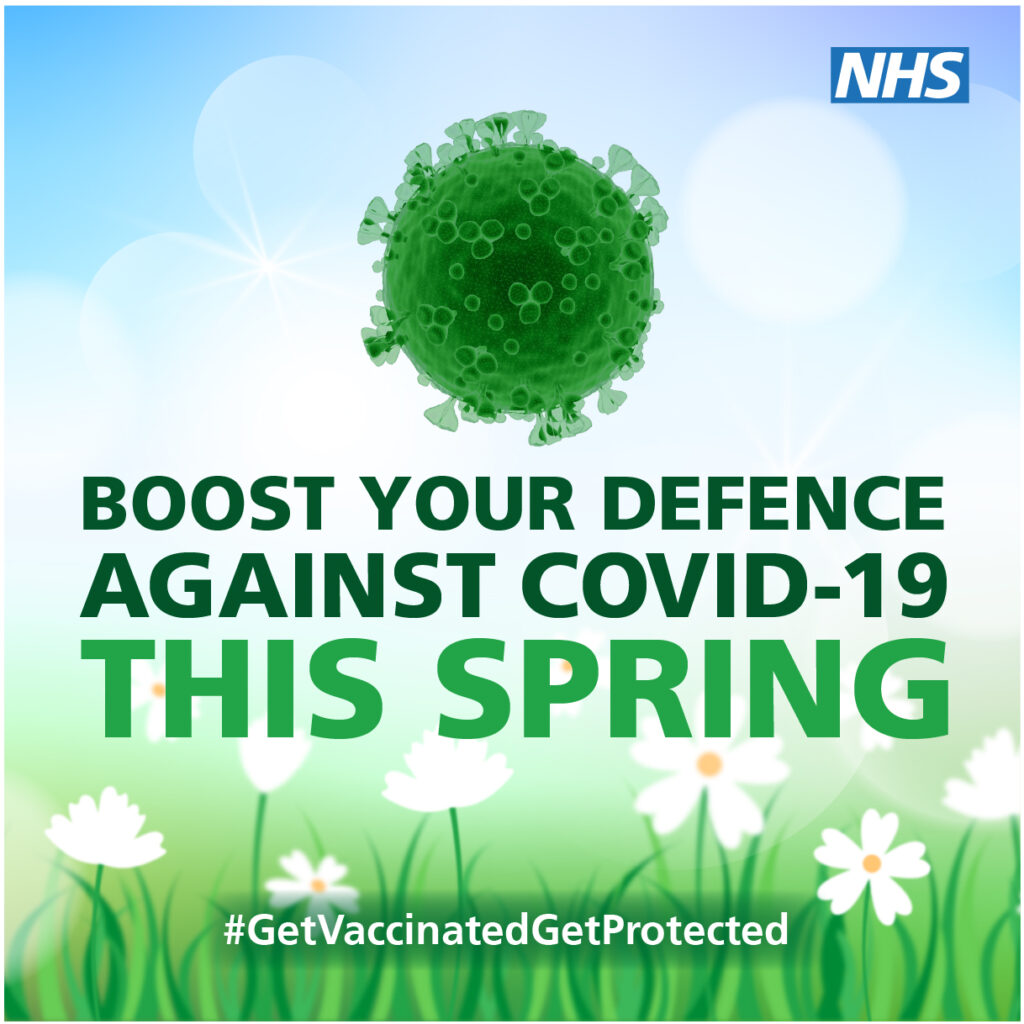COVID-19 Spring Vaccination Programme
People aged 75 years and older, residents in care homes for older people, and those aged 5 years and over with a weakened immune system will be offered a booster of coronavirus (COVID-19) vaccine this spring.
NHS COVID vaccines have saved countless lives, kept tens of thousands of people out of hospital, and helped us to live with the virus without fear or restrictions.
But the virus is still with us and making thousands of people ill every week, and protection against COVID-19 (either from catching the virus or from a previous vaccination) fades over time.
So, this spring, the NHS is offering a further vaccination to those at highest risk of severe illness from COVID-19.
Those who can get a spring vaccination include people aged 75 and over (by 30 June 2023), people with a weakened immune system, and residents of care homes for older adults.
Vaccinations in care homes for older adults begin from the week of 3 April. Other eligible people can book their spring vaccine from 5 April, and appointments start from 17 April.
The NHS will write to people to remind those eligible that they can get the vaccine, but bookings can be made at any time.
The last date people will be able to book a spring booster will be 29 June, with the last spring vaccinations on offer the following day, 30 June.
If you are eligible, you can make a booking by using the NHS App or visiting nhs.uk/CovidVaccination. If you can’t get online, you can call 119 for free.
Make sure you and your loved ones get any extra protection you need this spring.

The ‘evergreen’ offer:
- The current offer of first and second COVID-19 vaccinations for everyone (who was aged 5 on or before 31 August last year) will end at the same time as the next round of spring vaccinations, on 30 June 2023.
- After 30 June, not everyone will be able to get a COVID-19 vaccine.
- The offer will become more targeted to those at greatest risk, following recent advice from the JCVI, to those aged 5 and over who are severely immunosuppressed.
- People in this group will usually only be able to get the vaccine at times when seasonal vaccinations are offered. Those who become severely immunosuppressed at other times may be able to get a first or second dose sooner.
- The COVID-19 vaccine has saved countless lives, helped tens of thousands of people stay out of hospital, and made it safer for us to live with the virus without fear or restrictions.
- We strongly encourage anyone eligible who is yet to take up the offer of a first or second dose to get these as early as they can before 30 June, to help protect themselves and those around them.
FAQs
Why do I need another dose of the COVID-19 vaccine?
Like some other vaccines, levels of protection may decline over time. Vaccinations are being offer to those as greatest risk this spring to help them to maintain strong protection from becoming seriously ill or needing to go to hospital if they catch COVID-19.
Who can get a COVID vaccination this spring?
Following JCVI guidance, the following groups of people will be offered a booster this spring:
• adults aged 75 and over
• residents in a care home for older adults
• people aged 5 and over who have a weakened immune system.
When can I get a spring vaccination?
You can book an appointment from 5 April, with the first appointments to take place on 17 April. They will be on offer until 30 June, and 29 June is the last day that you can book.
How will I be invited for a spring vaccination?
If you’re eligible for a vaccination this spring, you will receive a text message, email, NHS App message or letter from the NHS when it’s your turn to come forward.
Which vaccine will I be given?
The JCVI has advised the following vaccines may be used in the 2023 spring programme:
- Pfizer-BioNTech bivalent
- Modern bivalent
- Sanofi/GSK monovalent (beta variant)
- Novavax monovalent (wild-type variant) – only for use when alternative products are not considered clinically suitable
All of the available vaccines provide good protection against severe illness from COVID-19. Further information is available at www.nhs.uk/covidvaccination.
Has the vaccine been given to people like me?
All COVID-19 vaccines offered in England have been approved for use by the independent Medicines and Healthcare products Regulatory Agency (MHRA).
These vaccines have met the MHRA’s strict standards of safety, quality and effectiveness. There are checks at every stage in the development and manufacturing process, and continued monitoring once it has been authorised and is being used in the wider population.
Each of the vaccines are tested on tens of thousands of people across the world. They are tested on both men and women, on people from different ethnic backgrounds, and of all age groups.
Will I need the same type of vaccine as I had before?
No, all COVID-19 vaccines you’ll be offered are highly effective and provide a strong booster response. When you attend your appointment, the NHS will offer you a safe, effective vaccine.
Will I be offered an autumn/winter vaccination this year?
The JCVI has not yet issued its final advice on 2023 autumn/winter vaccinations. When these are available, they are likely to be offered to people who are at increased risk from COVID, for example due to their age or a health condition.
If you become eligible for an autumn/winter vaccination later this year, the NHS will let you know when it’s your turn to come forward. Please wait to be contacted by the NHS about this.
Why does one of the vaccines now contain shark-derived oil?
Please see this UKHSA page for information about why some chemicals – called adjuvants – are used. This includes squalene, the shark-derived oil in the VidPrevtyn Beta vaccine manufactured by Sanofi-GSK.
Will I have to have the Sanofi-GSK vaccine if offered?
We know that some people will not be able to receive the Sanofi-GSK vaccine, for example for reasons of faith, because it contains an ingredient derived from shark. For people in this situation, an alternative COVID vaccine will be available.
Are COVID vaccines permitted during Ramadan fasting?
As COVID vaccines are intramuscular, some Muslim scholars believe that they do not invalidate fasts. However, we are aware that other Muslim scholars believe fasts may be invalidated by receiving the (Sanofi-GSK) vaccine that contains animal ingredients, due to potential nutritional value of the oil. You may therefore wish to seek further advice from your local Imam or request to receive one of the other vaccines that does not contain shark-derived oil.

